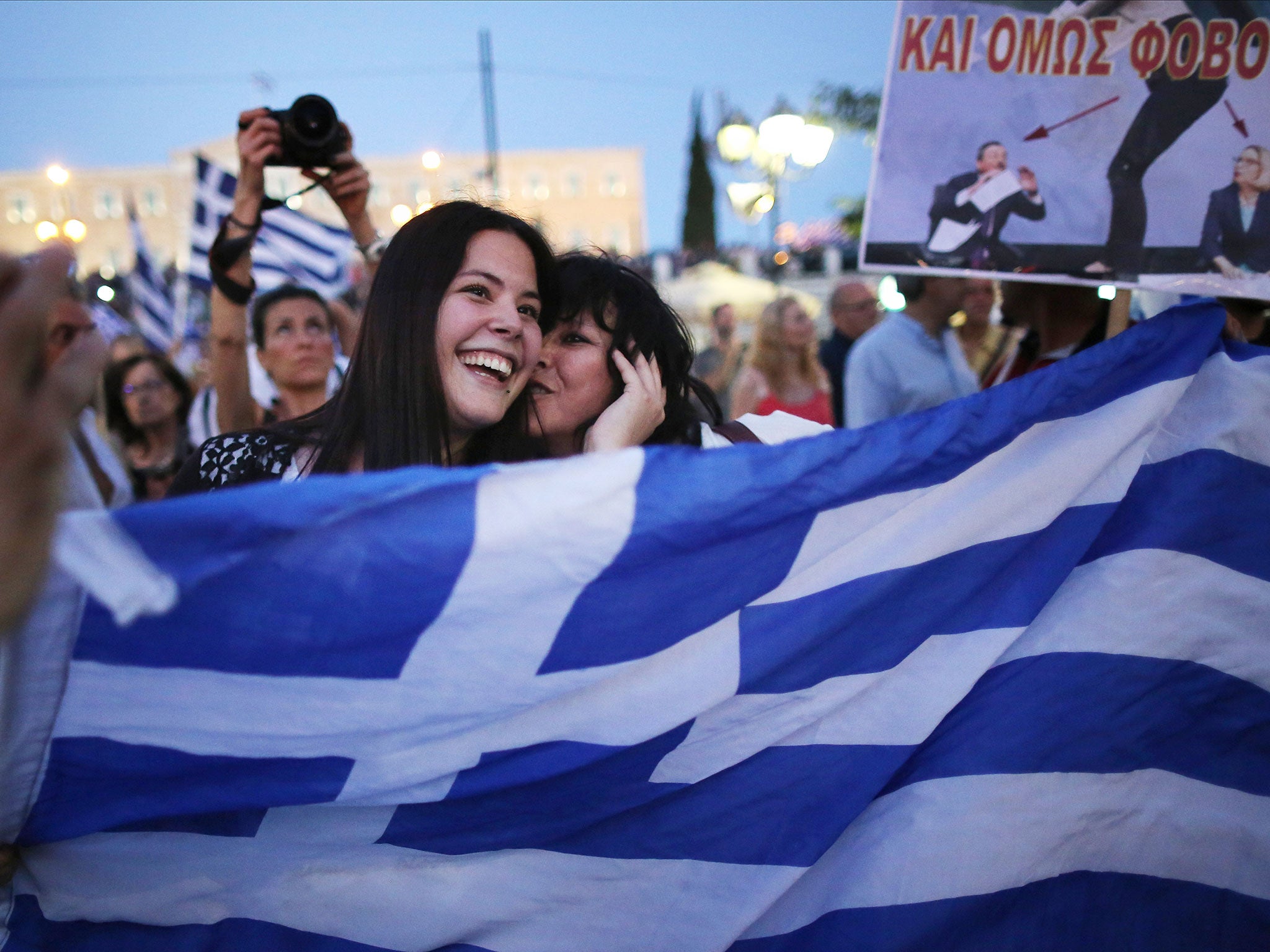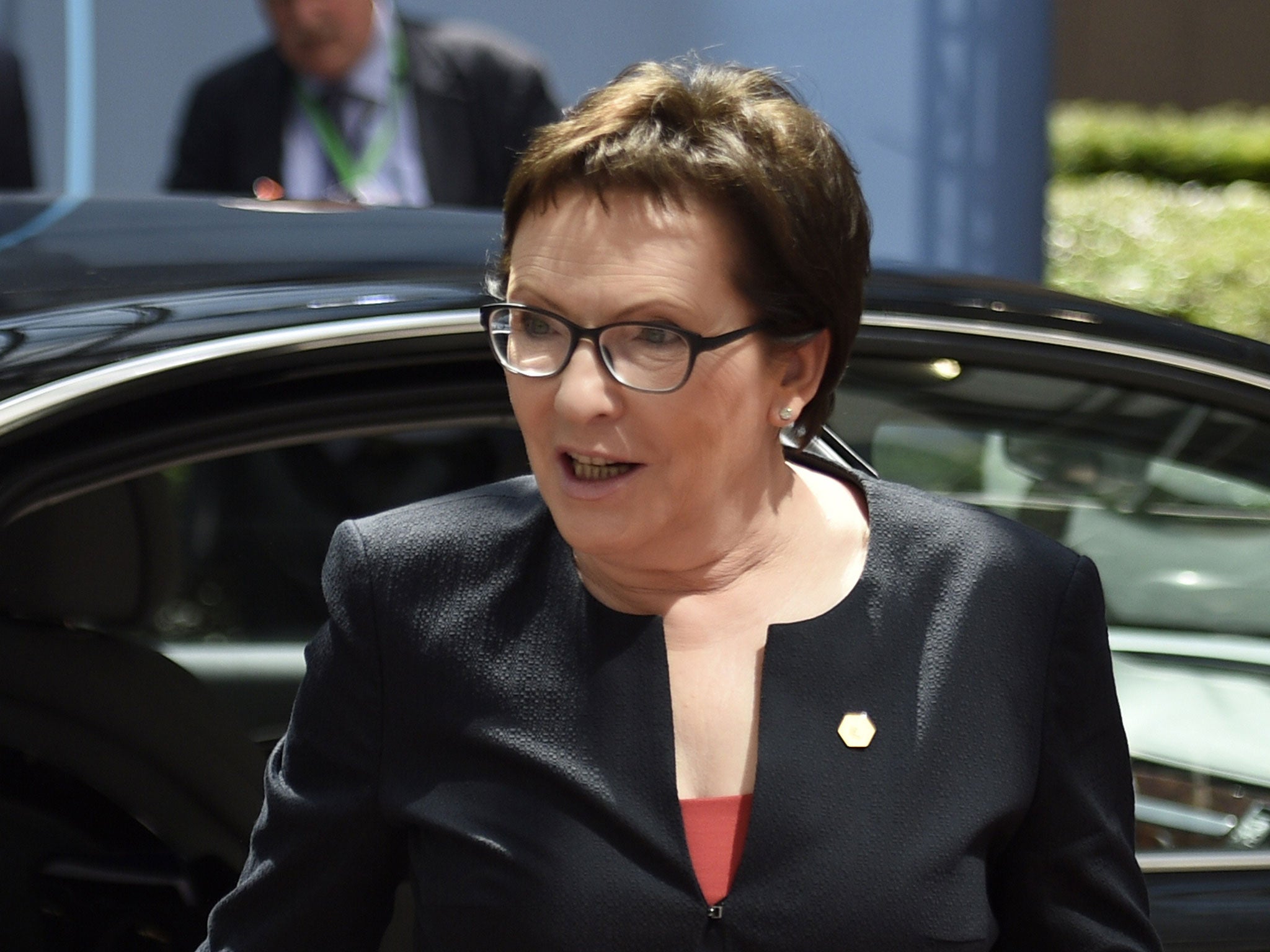Greece referendum: Greeks say 'No' to austerity and plunge Europe into crisis
Athens calls the vote a victory of democracy over economic 'terrorism'

Your support helps us to tell the story
From reproductive rights to climate change to Big Tech, The Independent is on the ground when the story is developing. Whether it's investigating the financials of Elon Musk's pro-Trump PAC or producing our latest documentary, 'The A Word', which shines a light on the American women fighting for reproductive rights, we know how important it is to parse out the facts from the messaging.
At such a critical moment in US history, we need reporters on the ground. Your donation allows us to keep sending journalists to speak to both sides of the story.
The Independent is trusted by Americans across the entire political spectrum. And unlike many other quality news outlets, we choose not to lock Americans out of our reporting and analysis with paywalls. We believe quality journalism should be available to everyone, paid for by those who can afford it.
Your support makes all the difference.The people of Greece have presented the European Union with the greatest political crisis in its history after voters decisively rejected years of further austerity and effectively challenged Brussels to throw a member state into the economic abyss.
The Syriza-led government in Athens celebrated what it called a victory of democracy over economic “terrorism”, with the Greek people voting overwhelmingly against the demands of the country’s hated creditors. The final tally of the referendum was 61.3 per cent No and 38.7 per cent Yes.
Such rhetoric has done little to endear Athens to the mainly German and French politicians it will now have to persuade to save the country’s economy. Germany’s Vice-Chancellor, Sigmar Gabriel, warned that Greece was heading for “bitter abandonment and hopelessness” following the vote.
European officials had lined up all last week to warn that a No vote would mean exit from the euro, but Greece’s voters decided to call what Syriza insisted was a bluff.
In a statement, the European Commission (EC) said it “takes note of and respects the result of the referendum in Greece”.
“[EC President Jean-Claude] Juncker is consulting … with the democratically elected leaders of the other 18 Eurozone members as well as with the heads of the EU institutions,” it added.
At a meeting in Paris on Monday, the German Chancellor, Angela Merkel, and French President, François Hollande, who spoke by phone on Sunday night, may take one of the most important decisions in EU history. A eurozone leaders’ summit is also due to be held on Tuesday.
They will be faced with a choice of either swallowing their pride, putting European solidarity first and making a deal that would see their own taxpayers lose money, or cutting Greece off, forcing it to start printing its own currency as the euros run out.
The country’s financial institutions had a lending reserve of no more than €500m (£356m) on Sunday and may not be able to dispense any more euros by mid-week unless they receive emergency funding from one of Greece’s main creditors, the European Central Bank.
Addressing the nation on television, the Prime Minister, Alexis Tsipras, thanked voters for making a “very brave choice” and said the result showed that “democracy won’t be blackmailed”.
It would also mean that debt relief would be “on the negotiating table”, he insisted, something that eurozone leaders have previously resisted. Greece owes about €323bn , about 60 per cent of which is owed to eurozone countries.
“The Greek people today gave an answer to what [kind of] Europe we want. What we want is a Europe of solidarity,” Mr Tsipras added.
Greek television reported that he spoke to Mr Hollande and several other European leaders by phone as early results showed the No camp winning by about 60 to 40 per cent.
And there were some glimmers of hope for Greece, with Emmanuel Macron, the French Economy Minister, saying Europe could not “crush an entire people” and a compromise must be found.
Panagiotis Kouroublis, Greece’s Health Minister, told The Independent that he believed “democracy works in Europe” and the referendum result would “force everyone to reassess their position”.
“Europe will have the responsibility. Europe cannot simply shift its responsibilities to others,” he said. “Europe will have to give the banks the possibility [to open] and that means respect to democracy, and to immediately begin the negotiations and conclude them in no time.”
Antonis Samaras, the former Greek Prime Minister, announced his resignation as leader of the main opposition New Democracy party as the result became clear. He urged Greeks to pressure the government to make a quick deal with its creditors.

But leading German politicians appeared in little mood to show mercy. Mr Gabriel told the Tagesspiegel newspaper: “With the rejection of the rules of the eurozone … negotiations about a [bailout] programme worth billions are barely conceivable.”
And Poland’s Prime Minister, Ewa Kopacz, said a No victory would mean “the path of Greece can be only one: leaving the eurozone”.
On the streets of Athens, the mood was a mix of celebratory defiance and fatalism. Thousands of people flooded into Syntagma Square, waving flags, blowing whistles and chanting. “I feel joy and satisfaction,” said Maria Siamaki, an unemployed secretary waving a Greek flag. “I don’t care if I’m hungry tomorrow or if we go bankrupt, I don’t care. I have a kid who is sick and I might not be able to take care of [the child]. But I don’t care, we’re finding again our lost pride and dignity and that’s the most important thing.”
There have been fears of a breakdown in law and order. Last week Panos Kammeno, Greece’s Defence Minister and leader of the nationalist Independent Greeks party in the coalition, warned the army would step in to ensure “stability in the country in the worst moments for our homeland” if required.
But on Sunday night he put such bleak thoughts to one side as he joined in the celebrations. “The Greek people have proven that they won’t be blackmailed,” Mr Kammeno said. “They won’t be terrorised. They won’t be threatened. Democracy has won.”
Bernie Sanders, a US senator from Vermont who is running for the Democratic nomination for president and describes himself as a “democratic socialist”, said: “I applaud the people of Greece for saying ‘no' to more austerity for the poor, the children, the sick and the elderly.
“In a world of massive wealth and income inequality, Europe must support Greece’s efforts to build an economy which creates more jobs and income, not more unemployment and suffering.”
Join our commenting forum
Join thought-provoking conversations, follow other Independent readers and see their replies
Comments